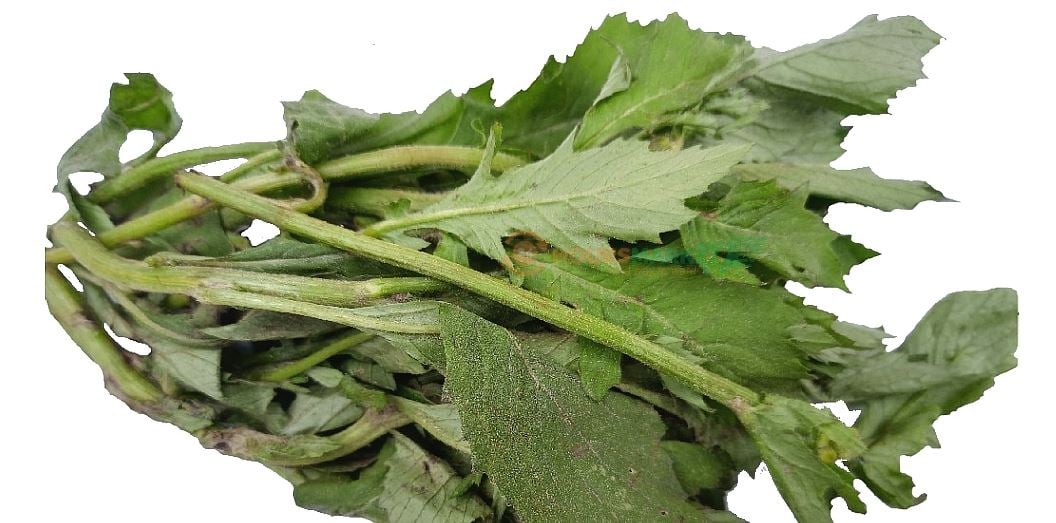6 Amazing Health Benefits of Okra

Okra is evocatively referred to as “lady finger.” It is not merely used in the preparation of soups or stew. Noted as a nutritional powerhouse, this green plant contains vitamins A, C, and K, fiber, magnesium, and antioxidants.
Many cultures have hailed okra as a ‘superfood’ for a long time now. Have you ever thought about how this vegetable can improve your health? Then you would like this. Find out six health benefits of okra that make it a dietary powerhouse for healthy living.
1. Rich Source of Nutrients
Okra is a nutrient-rich vegetable that the culinary world has long lauded. This unassuming green pod contains vital vitamins, minerals, and dietary fiber, providing essential health benefits. When you eat okra, you essentially give your body a full toolbox to help carry out its processes.
A Vitamin Powerhouse
Okra’s vitamin content is nothing short of remarkable: “Packed with vitamins A, C, K, the vegetable helps in boosting immunity and maintains the system of the body”. Vitamin A helps make your eyes healthy and work at their best. Vitamin C, meanwhile, fortifies the immune system, which is the body’s natural defense against colds and infections. Vitamin K helps your blood clot.
Therefore, it helps speed up the healing process. Another powerful ingredient in okra’s arsenal is the antioxidant polyphenol. These antioxidants help fight free radicals, the unstable molecules that cause damage to cells and age appearance. The antioxidants in okra prevent oxidative stress from harming cells, leading to healthier skin.
2. High in Dietary Fibre
Okra is a great food choice for those who don’t get enough fiber. It is packed with soluble and insoluble fibre, which controls digestion and keeps it constipation-free. Fibre is like a broom for your intestines, helping to remove toxins from your gut and ensuring regular functioning.
Eating okra is suitable for your gut as it helps to create good bacteria, which are essential for having a healthy gut microbiome. Furthermore, fibre plays a significant role in managing weight. High-fibre foods such as okra help you feel complete for extended periods, preventing overeating and snacking.
This vegetable is a good addition to your diet if you want to lose weight or control calories. Want to learn how dietary fibre supports the wellness of the body? This WebMD article on Okra delves deeper.
Okra's unique combination of vitamins, antioxidants, and fiber makes it a special vegetable that can help your body in various ways. Adding to dishes is not just a delicious choice; it is something your body will be grateful for repeatedly.
3. Supports Heart Health
Most people love okra as a household food. It also helps promote heart health, even if overlooked by everyone. The nutrients in okra make it a beneficial food for your heart and blood vessels. Let’s see how this green vegetable can enhance your heart.
Polyphenols and Antioxidants for the Heart Okra contains natural compounds called polyphenols, which are potent antioxidants. These powerful substances protect the heart against oxidative stress, one of the leading causes of heart disease.
But what is oxidative stress, exactly? Imagine rust developing inside your body because of harmful molecules we call free radicals. If oxidative stress continues, it can harm cells and tissues, leading to chronic conditions. Antioxidants fight free radicals like bodyguards.
Okra's polyphenols can neutralize these free radicals, drastically reducing inflammation and lowering the risk for diseases like atherosclerosis. Research shows that polyphenols can also help improve blood flow, allowing your heart to function efficiently. To learn more about the antioxidants in okra, check out this resource on Okra from the Cleveland Clinic. Studies show that eating lots of antioxidants can lower the chances of a stroke due to a blood clot.
Binding Cholesterol with Okra's Gel-like Mucilage
Okra has the unique quality of having a gel-like mucilage. Even though it may sound unappetising, this thick substance significantly impacts your digestive system. One of its most impressive features is that it binds to cholesterol in your gut. Mucilage grabs onto cholesterol during the digestive process and ensures it is eliminated by passing stools instead of absorbed into the blood.
Okra prevents plaque from accumulating in arteries by reducing the body’s LDL (bad cholesterol) levels, thereby avoiding stress on the heart. Pulling it out of your body checks your cholesterol and is suitable for your heart. Looking to learn more? Read this article on Okra and Heart Support, which discusses how research has shown that people who eat this veggie regularly have reduced cholesterol levels.
Okra is deemed a heart-healthy vegetable due to its polyphenol content and cholesterol-binding capabilities. Adding it to your food may be an easy way to improve your heart health.
4. Helps Manage Blood Sugar Levels
Okra is tasty and versatile and plays a key role in controlling blood sugar levels. With helpful materials and natural features, okra is essential to diabetes caregiving and sugar control. Okra can be a good option whether you are checking out plant-based aids or looking for extra foods to control sugar.
Glucose Regulation with Okra Extracts
More studies are showing that okra extracts may stabilize blood sugar. The polysaccharides and flavonoids in vegetables may help with high blood sugar by improving insulin sensitivity and glucose absorption. For people with pre-diabetes or type 2 diabetes, these benefits can be simple and practical. A study conducted by researchers and published in The Frontiers Journal found a significant drop in elevated blood sugar levels after administering extracts of the okra pod.
A different study published by the American Diabetes Association confirmed the anti-hyperglycemic properties of okra pods. These findings indicate that okra extracts may serve as a secondary glucose management tool when included in a health plan.
According to studies, okra's unique composition may control the enzyme responsible for the digestion of carbohydrates into glucose. This slows down the release of glucose in the blood to prevent sudden rises in sugar levels. To fully understand how okra helps metabolic health, take a look at this paper, which goes into detail.
Okra Water for Sugar Control
Many health-conscious people are now soaking okra in water for drinking. The idea is pretty simple: You soak raw okra pods in water overnight to let the nutrients and compounds dissolve. Nutrient-filled water is said to help manage blood sugar levels and is called okra water. Okra's unique features are creating enthusiasm about this ancient practice. The high soluble fiber content helps slow down gut sugar absorption.
This fiber helps to soak up sugar and bring it closer, reducing its entry into the blood. Also, the mucilage in the pods may help control sugar by binding with excess sugar and assisting in its excretion. Okra water is still being researched, but people online have reported that it’s easy to make and neutral for people with diabetes and anyone looking to control sugar intake.
Along with this, follow a routine diet and lifestyle changes for best results and all-around glucose control. Research on okra water is not advanced, but if you are diabetic or looking to control sugar levels, this can be easily included.
Pairing this with a regular diet and lifestyle modification will ensure maximum benefits and well-rounded glucose control. These effective strategies can help you enjoy the benefits of okra and manage your sugar levels.
5. Potential Anti-Cancer Properties
Okra is more than just pleasing to eat. It can also be one of the most natural substances to save lives. Okra has cancer-fighting properties. It has several bioactive compounds, and it continues to receive attention from researchers because of its ability to support healthy cells and possibly prevent cancer.
Let’s explore how lectins and antioxidants are making a difference in cancer treatment. Role of Lectin in Cancer Cell Inhibition Lectin is found in the vegetable ‘okra’ and studies have shown good anti-cancer properties.
Lectin’s ability to bind to specific sugar molecules on the surface of cells is fascinating. This unique function allows the lectin to tell normal and cancer cells apart. Imagine it as a guard that destroys harmful cells but does not touch healthy ones. Laboratory tests have shown that lectin taken from plants, including okra, can prevent the growth of cancer cells. It does so by triggering apoptosis, which causes cancerous cells to die.
The process serves like a self-destruct button that forces cancer cells to shrink and die. Research also suggests that lectin may promote autophagy, encouraging cells to clean house by removing damaging parts that could mutate.
A significant study in the Journal of Plant Lectins and Their Therapeutic Roles shows how plant lectins can interfere with cancer cells. According to a different survey from PMC, lectins may be helpful to anti-cancer agents that bind to the glycan markers on tumor cells. This research suggests hope for creating a new kind of natural cancer treatment.
Antioxidants and Cancer Prevention
Free radicals damage cells and make way for the development of cancers after some time. Antioxidants are like a strong defense system – they can protect your body’s cells from damage caused by free radicals. Okra is rich in antioxidants.
One antioxidant in okra is flavonoids, which help fight oxidative stress. But how does this work? Think of free radicals as sparks in a dry forest. If not taken care of, they spark a disastrous chain reaction that harms cellular DNA in your body and increases the chances of mutations.
Antioxidants put out the fire, helping you from oxidants that cause problems within our body. Research shows that flavonoids and other antioxidants can lower cancer risk. Studies on ScienceDirect say that antioxidants lessen cell damage, diminishing the chance of abnormal cell growth.
According to a study published in the Wiley Online Library, individual components of a plant working together might enhance the effectiveness of cancer treatments when used in diets. Along with free radicals, okra's antioxidants have the potential to reduce inflammation that may cause cancer.
If we target the root causes, daily consumption of okra can act like a daily maintenance dose for your cells. When lectin's cancer-cell-inhibiting properties are combined with an antioxidant's cancer-preventing power, okra becomes a versatile vegetable.
You wouldn’t expect such a small thing to take on something as big as cancer – and win!
6. Boosts Immune System and Overall Wellness
Okra not only tastes good but also strengthens the body from within. Loaded with vitamin C, this vegetable boosts immunity and improves skin health and wound healing. Let’s unpack how okra contributes to these vital areas.
Vitamin C and Immune Boosting
One of the things that helps boost immunity is vitamin C, and oh boy, does okra have the goods. This vitamin, which is soluble in water, encourages the formation of white blood cells. White blood cells are the body's soldiers that attack infectious agents. This makes the person cold and virus-resistant.
Also, vitamin C is an effective antioxidant that fights off free radicals and protects cells against oxidative stress —this leads to chronic diseases and ageing. The reason why we often advised to include a lot of fruits and vegetables in our diet for immune enhancement is mainly due to antioxidants – vitamin C.
Check out this okra article for further insight into how vitamin C can enhance your defense system.
Improves Skin Complexion and Wound Healing
Okra can help maintain healthy, glowing skin, which is often associated with a healthy body. It is rich in Vitamin C and other antioxidants that work together to restore damaged skin cells. The protein collagen, which helps keep skin firm and elastic, is found in the skin.
Moreover, vitamin C hastens the healing of cuts, burns, and other injuries. It can help reduce inflammation, redness, and bacteria to prevent infection. When consumed, okra is a skin doctor for blemishes or minor scratches.
Studies even show that it can be used on the skin. For instance, this study indicates that okra extract has impressive antimicrobial and anti-inflammatory properties.
Incorporating these vegetables, also popularly known as ladyfingers, in your diet ensures that you keep your immunity and skin in check easily. This powerhouse food is a hidden gem that helps us achieve overall health and wellness.
Conclusion
Besides being a kitchen staple, okra offers a wealth of health benefits. This vegetable is beneficial in key areas of health, like boosting immunity, balancing sugar, protecting the heart, and possibly offering an anti-cancer claim.
Including okra in your fare may be the easiest yet most powerful step toward better health. You can use it in soups, stews, and even "okra water," which is why you should get creative with it.
Why not start your health journey with some okra recipes or learn more about their benefits? Learn more about the health benefits of okra to kickstart your health journey.
Take a step—your future self will thank you




